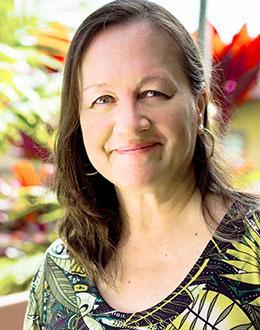Welcome to our latest interview with Native Hawaiian and local Hawaiʻi writers! Author Dani Hickman is the author of four delightful children’s books published by Island Heritage.
Hi, Dani. For those who haven’t met you, could you please tell us a little about yourself?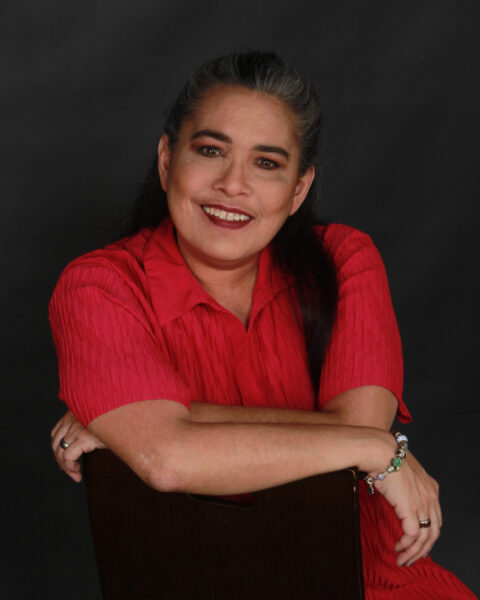
I’m a married local girl with four adult children. My youngest, who co-authored two of my books (How About a Pineapple? and Tako Lends a Helping Hand) just went off to college. My home in Waipio is still full with four dogs, one cat and one very fat beta fish. My day job is in Human Resources at a local adult in-home care service.
Where did you grow up? What high school did you grad from?
I’m a townie who graduated from McKinley High School. Go Tigers!
Indeed! Who is your biggest supporter?
My husband, Jeff, is my partner in all things. From raising the kids, to editing my writing, to being my arm candy at author events, Jeff has always been my rock. He is a Kamehameha grad and retired National Guard Veteran. His feedback and contributions in my stories definitely helps me add more “flavor” to anything I do.
Why did you become a writer? What inspired you to write for children?
I’ve always written short stories and poems since I was little. Publishing always seemed like something that was too difficult to achieve and I had no idea where to even begin. I had a co-worker, Tammy Paikai, who published a few children’s books and inspired me to give it a try. She was incredibly helpful and encouraging with all the behind the scenes stuff, like setting up for a book signing and being resilient during the editing process. I also LOVE her books. “Too Many Mangos” is my favorite Tammy Paikai book, so relatable in Hawaii and a great lesson of giving.
What do you enjoy most about writing for kids? What are some of your greatest challenges in writing for children?
I love the book signings and reading at the schools! Meeting children and hearing them say how much they love the story is such a heartwarming experience. My biggest problem when writing for children is my love for big words. Keeping stories at 2nd grade reading level and replacing “verbose” with “talkative” or “mean” in place of “malicious” is a challenge. My kids always loved “big” words but my editor has a different viewpoint.
What are your hopes and dreams for the year and beyond in terms of your writing career and what you would like to see published in the future?
I’d like to publish a chapter book for teens with a Hawaiʻi storyline. Maybe even a 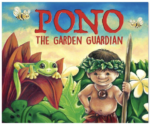 Hawaiʻi graphic novel. I’d also love to do a sequel for my first book, Pono, the Garden Guardian. He’s my favorite little guy with a big heart. I have a rough idea of what I’d like his next chapter to be. Publishing another adventure for him would be amazing.
Hawaiʻi graphic novel. I’d also love to do a sequel for my first book, Pono, the Garden Guardian. He’s my favorite little guy with a big heart. I have a rough idea of what I’d like his next chapter to be. Publishing another adventure for him would be amazing.
There are not a lot of stories for or by Native Hawaiians and Pacific Islanders. Why do you think that is? What do you think we can do the change that?
I agree that there are not enough Hawaiian/Pacific Islander children’s book authors. In my opinion, I think part of that stems from the Hawaiian culture itself. Hawaiian is a spoken language, traditionally passing stories through chants, song and dance. The lack of a written Hawaiian language did not become issue until the arrival of the missionaries. Today, there seems to be a limited group of traditional kumu who are perpetuating the culture as they always have, through oral teachings. I think more in the community are trying to reach out to keiki, but unfortunately, the pool of knowledgeable experts with a passion for writing and a focus on children’s stories is small. It may be helpful to have more outreach by cultural groups to encourage keiki to put their demands out there for books and also writing their own stories.
Do you have a website? Are you on social media? Do social media play a role for you as an author? Do your readers contact you? What do they say?
My website is sorely out of date. Iʻm also on Facebook. I been have slacking off considerably in promoting my books in the last couple of years. My focus was on my family and getting my daughter set up for college. Now that she is in college, I hope to get back to it. I have gotten email sent from my website, direct messages and comments on facebook and my direct email. Most of the feedback was through social media. A majority of the comments were around how much they liked the characters. A few made welcome critiques of different directions the 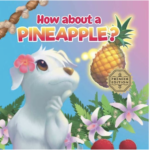 story could have gone. My favorite bit of feedback was that I didn’t name the puppy in How About a Pineapple? I purposefully left out a name because I noticed many children coming to book signings mentioned that their dog was the dog in the book. I felt naming the dog excluded all those keiki with white dogs that wanted to imagine their puppy on an adventure. The dog is named Kea in the book description but not in the story, and I still appreciate the comment.
story could have gone. My favorite bit of feedback was that I didn’t name the puppy in How About a Pineapple? I purposefully left out a name because I noticed many children coming to book signings mentioned that their dog was the dog in the book. I felt naming the dog excluded all those keiki with white dogs that wanted to imagine their puppy on an adventure. The dog is named Kea in the book description but not in the story, and I still appreciate the comment.
What advice do you have for aspiring writers?
READ READ READ! Learn how others weave their stories and develop their characters. All those different styles helps you find your own. Be open to feedback from others, it can only make you better. Write about what inspires you. Don’t be discouraged — keep trying.
Can you share a bit of your current work?
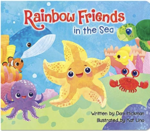 The last book I published was a baby book, Rainbow Friends in the Sea. I’ve always loved rainbows and wanted to write a color book for little ones. It’s a board book with a simple rhyming theme showing the basic colors of the rainbow in sea life. My favorite part of the book is a mirror in the end, because “You’re my newest Rainbow Friend.”
The last book I published was a baby book, Rainbow Friends in the Sea. I’ve always loved rainbows and wanted to write a color book for little ones. It’s a board book with a simple rhyming theme showing the basic colors of the rainbow in sea life. My favorite part of the book is a mirror in the end, because “You’re my newest Rainbow Friend.”
Which of your books did you have the most fun writing? Which were the most challenging?
Writing How About a Pineapple? with my daughter was the best experience. At 12 years old she was bursting with ideas and edits. It was a blessing working with her.
My first book, Pono the Garden Guardian, was the hardest to write. I invested a great deal of my heart in that book, and it was too long. The text needed to be cut in half. Cutting something you love down to its core was very difficult for me but also a valuable lesson. Great stories can be a relationship between the author and the reader. Using fewer words allows the reader to fill their mind with the pictures they create. The writing is just there to point and to guide.
What beliefs are your books challenging?
I think there are many stories about heroes. I believe everyone can be a hero. You just have to decide how. My characters aren’t “super,” they’re YOU in different situations. They’re YOU choosing to be a good person in a small, but significant way.
What’s your experience with publishing your books?
I’ve had good experiences with my publisher. Island Heritage is well known for quality and has a history of amazing works. I’m honored that they allowed me to share my stories and support me as an author.
Where do you get ideas for your books?
I write stories I want my children to learn from. I take a lesson like self-less giving, doing what’s right and working well with others, and I have the characters show you why that lesson matters. Inspiration is everywhere and in common everyday things. Children’s stories should shine a light on a different way to look at something, from different perspective. It’s a great way to learn no matter what your age.
Which characters do you relate with easily? Why?
The character closest to me is Tako Lends a Helping Hand. Tako wants to 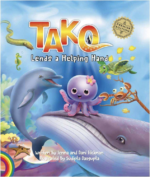 help everyone but takes on more than she can do and ends up forgetting everything she’s already promised. Managing tasks and time while working with others to get things done is something I think many people can relate to. Tako is an octopus, so it’s a little wishful thinking to hope for a few extra hands on busy days.
help everyone but takes on more than she can do and ends up forgetting everything she’s already promised. Managing tasks and time while working with others to get things done is something I think many people can relate to. Tako is an octopus, so it’s a little wishful thinking to hope for a few extra hands on busy days.
Can you share a bit about your next book?
I always have 10–12 books in different stages at all times. It’s common for me to put something down for months and come back to it with fresh eyes. The book I have that’s a bit farther along than most is a story about not wanting to go to bed. It’s got more of a national theme, and it rhymes, which is always a bit more challenging to get the rhythm right. Many parents can connect to a story of a child wanting to stay up a little later than they should.
Mahalo, Dani, for sharing your manaʻo with us! To contact Dani Hickman and learn more about her books, please visit her website at thedanihickman.com.



